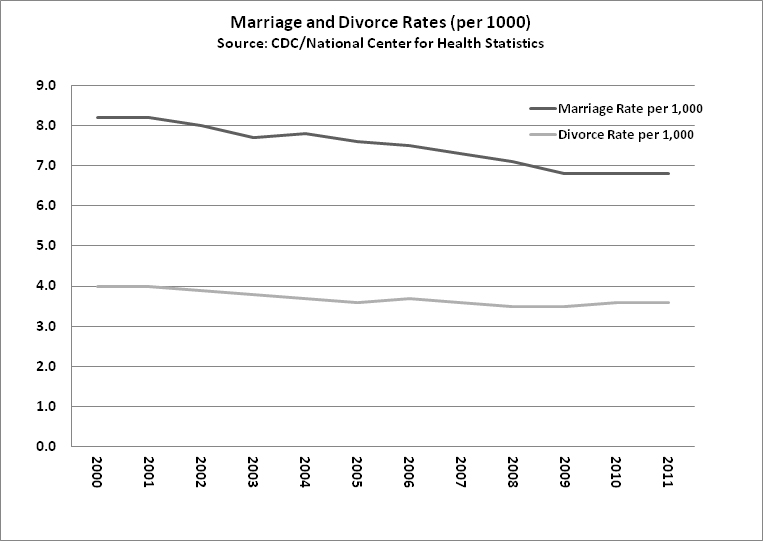By Kaity Sample and Aimee Brandon Posted February 18, 2015
To this generation, divorce is a tragic, yet normal, occurrence. So when did it become “a thing?” Back in the 1500s King Henry VIII of England had different means of divorcing a woman; some he had beheaded and some of the marriages he had annulled (declared invalid) and then later had his ex-wife executed. At that time divorce was obviously not “a thing.” Most sources attribute the 1960s and 1970s to the decades of divorce because that is when most countries started to accept divorce.
Nevada has the highest divorce rate in the United States, and Massachusetts has the lowest rate. Everyone has heard the statistic that 50% of all marriages end in divorce. This may not be accurate, but the rate is nevertheless high and divorce impacts many in the United States. Nearly 10% of the United States population is divorced.
Statistically, there is some good news; the divorce rate is going down (See chart). However, this is likely because the marriage rate is also falling.
As divorce is a significant issue in the US, society should consider the most common reasons for divorce, the effects of divorce on children, and the effects on the spouses.
Now that those facts are out of the way, why do people say “till death do you part” then get divorced, before death has a chance to part them? The book, “Should I Keep Trying to Work It Out” may produce some insight into how the forces work against marriages. It says the most common factors to divorce are, “marrying at a very early age, less education and income, living together before marriage, a premarital pregnancy, no religious affiliation, coming from a divorced family, and feelings of insecurity.”



When people are asked why they divorce the most common reasons are “lack of commitment, too much arguing, infidelity, marrying too young, unrealistic expectations, lack of equality in the relationship, lack of preparation for marriage, and abuse.” These are all strong points that could validate divorce, but take a moment to consider a little more concrete reasons such as domestic violence, infidelity or cheating, and addictions to alcohol, drugs, or pornography all of which could possibly be the results of one another. People have a right to their opinion about what excuses or validates a particular divorce and who it affects.
Not all people who divorce have children but 50 percent of American children will witness the divorce of their parents before they are 18, and almost half of those kids will witness their parents divorce yet, another time. These children are impacted just as much or possibly more by divorce than the parents, and that is always sitting on their shoulders.
“Seeing people with their biological parents still with each other, I never really knew what that was like,” said a female junior whose parents divorced when she was young.
Children who come from divorced families are more likely to partake in drug use, and alcohol use and are more sexually active than those families that are still intact. Divorce is also linked to a lower level of academic performance. According to ABC News in a study of 3,500 children, those whose parents divorced had lower math scores and had poorer interpersonal skills than those whose parents stayed married. Divorce also has a long-term impact on children and can also affect their own marriages when they’re older. Almost 35 percent of children who face divorce during their early years will experience their own divorce.
Many children with divorced parents experience anxiety, anger, shock, and disbelief. Following divorce, teenagers are more likely to need psychological help, than those with married parents. Some people are eventually able to come to terms with and get used to their parent’s divorce like student Dusty Robinson but not everyone can.
“I got used to my parents being separated. I wouldn’t know what to do if they were together still,” said Dusty Robertson.
Divorce affects all children, no matter what their age is. It affects everyone in many different ways, but being a teenager and growing up with divorced parents impacts them more than younger children whose parents are going through a divorce. Toddlers and middle school kids most likely do not have the mental understanding of how divorce affects their parents and themselves, but as they get older, it affects them more and divorce becomes harder to handle.
Going through a divorce is hard enough. Having to deal with your parents no longer talking, families being torn apart, moving from house to house every other weekend, or only seeing one parent on a monthly basis and feeling like parents are competing is rough on kids.
“Switching back from house to house is difficult because it is almost like a different atmosphere between both houses. Sometimes it feels like a competition,” said a 15-year-old Lowry student.
Younger children have a hard time going through divorce too, but growing up constantly being around both of your parents and then having to get used to change is a difficult process.
A case of the parents not being divorced may show what so many children with divorced parents are lacking. Student Veronica Jones’ family is very intact, she has an older brother Marquess and her parents, Chuck and Marilyn, who went to high school together at Lowry and are now married. Veronica sees the daily influence of her parents still being married in her life and even the influence of her grandparents still being married.
“My parents never divorced and I think that was a good influence on me never wanting to get divorced. The fact that my parents are still together and know each other so well allows us really to be a family,” said Veronica.
Looking back to her childhood she sees her relationship with her parents as a couple as a strength in her life.
“Being able to talk to both of my parents about things really helped me and I always really liked holidays and being able to be together as a family,” said Veronica.
Take a moment to think about your family holidays, do you have mom, dad, grandma, and grandpa in the living room on Christmas Eve? Or may you be missing a couple of people due to divorce? While divorce may be a negative thing for most people, it does have some positive effects. For example, after being divorced many people eventually remarry and while this second marriage has a greater chance of ending in divorce than the first, it could have good results. Through a second marriage, children have a chance to have another adult figure in their lives, although whether they accept that adult as a parent is another story. It can also be a factor in what kind of relationship the mother or father and their child have. Many teenagers have a hard time accepting a new parent and may even resent their mother or father for remarrying, but some, like Lowry student Leticia Gomez, are able to accept them.
“My relationship with my mom is good she’s like my best friend. My stepdad and I have a great relationship, he’s always been there for our family,” said Leticia Gomez.
It can be seen that children are dramatically influenced by their parent’s divorce, but the two people going through the divorce are also affected. There are financial, emotional, physical, social, and many other ways divorce affects the ex-spouses. Financially there is the cost of a lawyer and the possible splitting of the bank account. For parents experiencing divorce, there could possibly be child support or having to support a child on their own. Emotionally, divorce can tear people apart. This means children may have to choose between parents and they may see them less. The physical effects are most likely moving away from the house or even the town they once lived in during their marriage. The social effects can be friends choosing between a spouse, moving into a new financial class, moving away from the people you know, or becoming a much different person. The average age for divorce is 30 years old. Many people may think the easy solution for never getting divorced is never getting married, but 96 percent of Americans have been married at least once by the age of 70, and while the 50 percent of marriages end in divorce that means there are those 50 percent that never end. It’s a glass half-empty or half-full scenario.
The effects of divorce have been listed but put a spin on it and consider the effects of not getting divorced. Those effects can be both positive and negative. they accept that an adult as a parent is another story. It can also be a factor in what kind of relationship the mother or father and their child have. Many teenagers have a hard time accepting a new parent and may even resent their mother or father for remarrying, but some, like Lowry student Leticia Gomez, are able to accept them.
“My relationship with my mom is good she’s like my best friend. My stepdad and I have a great relationship, he’s always been there for our family,” said Leticia Gomez.
An anonymous Lowry student shared her experience with stepparents and the changing of parent relationships. Her parents have been divorced since she was a toddler, she lives with her mom, her father lives in another state, and both her parents are remarried.
The effects of divorce have been listed but put a spin on it and consider the effects of not getting divorced. Those effects can be both positive and negative.





